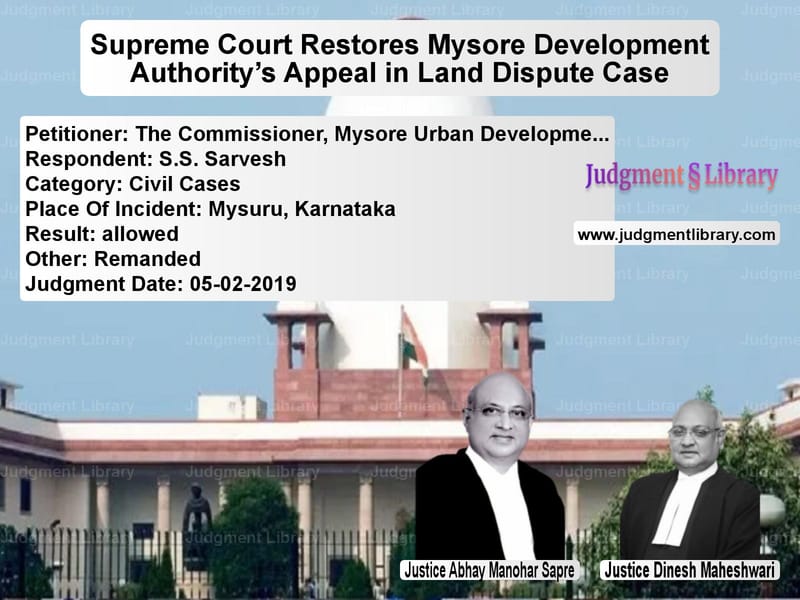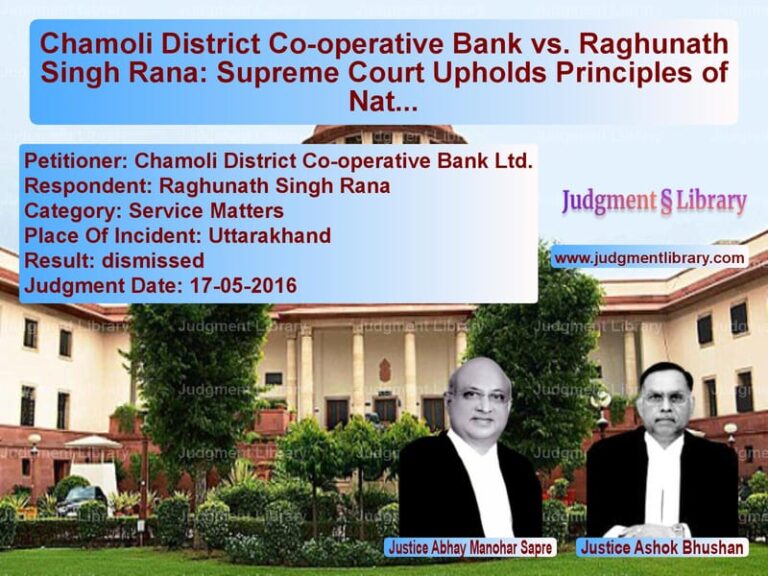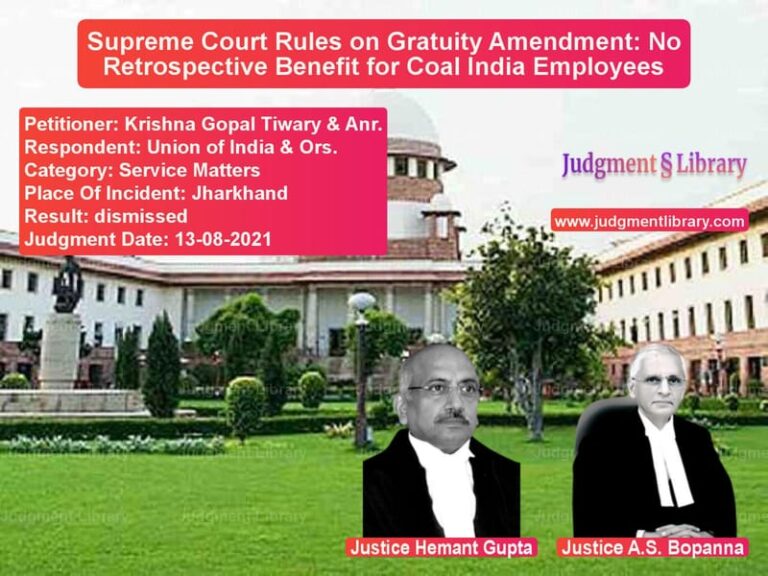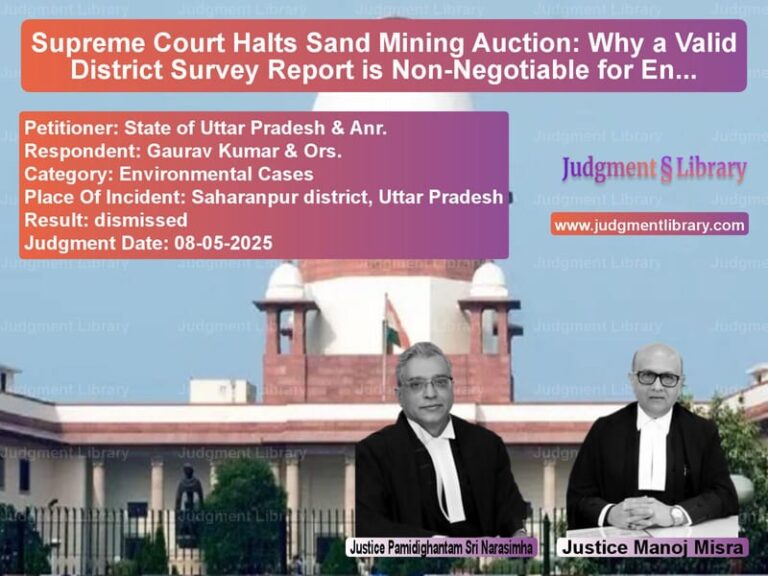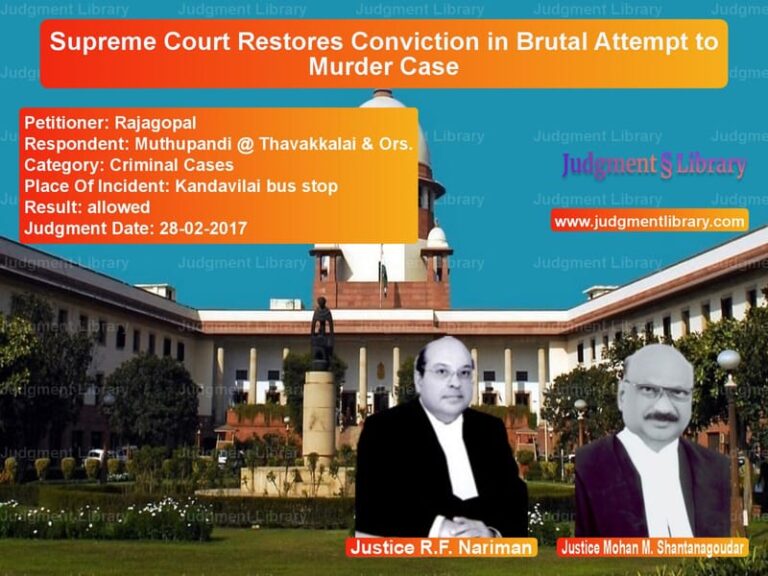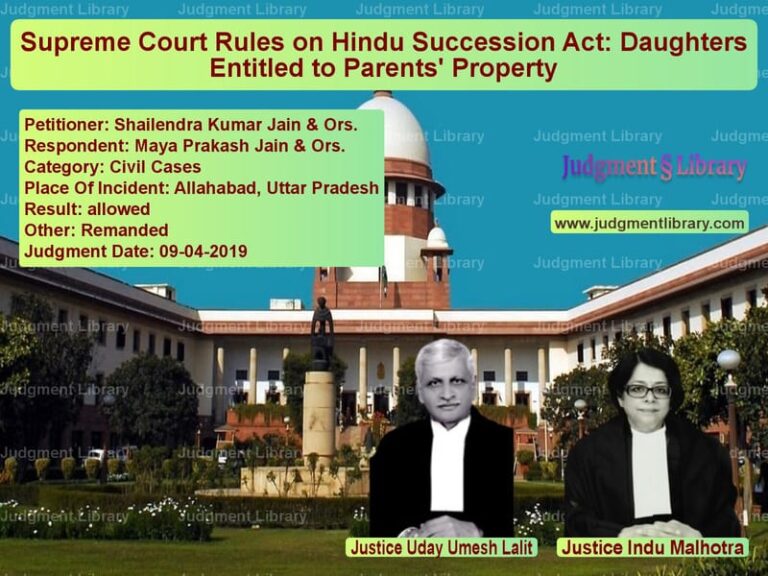Supreme Court Restores Mysore Development Authority’s Appeal in Land Dispute Case
The Supreme Court in The Commissioner, Mysore Urban Development Authority vs. S.S. Sarvesh dealt with an appeal challenging the Karnataka High Court’s order dismissing the Mysore Development Authority’s (MDA) writ petition. The dispute centered around land ownership and a civil suit filed by S.S. Sarvesh seeking a declaration of title and a permanent injunction.
Background of the Case
The dispute arose when S.S. Sarvesh filed a civil suit (O.S. No.685/2006) in the Principal Senior Civil Judge and Small Causes Court, Mysuru, against the Mysore Urban Development Authority (MUDA). The suit pertained to land bearing No. 2442 in Vijaynagara, 2nd stage, Devaraja Mohalla, Mysuru.
Key facts:
- The trial court decreed the suit in favor of S.S. Sarvesh on March 20, 2012, recognizing his ownership rights.
- MUDA filed a first appeal (R.A. No.370/2012) before the Principal District and Sessions Judge, Mysuru.
- On April 25, 2014, the appeal was dismissed in default as MUDA’s counsel failed to appear.
- MUDA filed an application for recall (M.A. No.77/2014), but the appellate court dismissed it on June 29, 2016.
- Subsequently, MUDA filed a writ petition before the Karnataka High Court under Article 227 of the Constitution.
- On February 19, 2018, the High Court dismissed the writ petition, leading MUDA to approach the Supreme Court.
Legal Issues
The case presented the following key legal issues:
- Whether MUDA’s appeal should have been dismissed in default when it concerned valuable land rights.
- Whether the Karnataka High Court erred in rejecting MUDA’s request for restoration of the appeal.
- Whether a litigant’s right to appeal could be dismissed on procedural technicalities when substantive rights were at stake.
Petitioner’s Arguments
MUDA, through its counsel, argued:
- The first appeal was dismissed due to the non-appearance of its counsel on April 25, 2014.
- The dismissal was unjust as the issue involved public land under the control of MUDA.
- The appellate court should have restored the appeal on showing sufficient cause.
- The Karnataka High Court failed to appreciate that the right to appeal is a substantive right.
- Precedents support that procedural lapses should not defeat substantive claims.
Respondent’s Arguments
S.S. Sarvesh opposed the appeal, contending:
- MUDA had multiple opportunities to contest the case but failed to act diligently.
- The trial court had already ruled in his favor, and the appellate court rightly dismissed MUDA’s appeal for non-prosecution.
- The case did not warrant interference as courts must not entertain habitual defaulters.
- The Karnataka High Court was correct in holding that the appellate court acted within its jurisdiction.
Supreme Court’s Observations
The Supreme Court, led by Justice Abhay Manohar Sapre and Justice Dinesh Maheshwari, considered the legal principles governing appeal dismissals.
“A code of procedure must be regarded as such. It is designed to facilitate justice and further its ends, not as a penal enactment for punishment and penalties.”
The Court highlighted the landmark case Sangram Singh vs. Election Tribunal, Kotah (1955), where it was held that procedural laws should not be used to frustrate justice.
Key observations:
- The right to appeal is a valuable right, and courts must be cautious in dismissing cases on technical grounds.
- Since MUDA was contesting a public land dispute, the matter should have been decided on merits.
- The Karnataka High Court erred in dismissing MUDA’s petition instead of converting it into an appeal under Order 43 Rule 1(t) of the Civil Procedure Code.
- The dismissal was in default, not on merits, meaning that the case was never properly heard.
Final Judgment
The Supreme Court ruled:
- The appeal was allowed.
- The Karnataka High Court’s order was set aside.
- MUDA’s first appeal (R.A. No.370/2012) was restored for hearing on merits.
- The appellate court was directed to dispose of the case within six months.
Conclusion
This judgment underscores the principle that courts should not dismiss substantive appeals based on procedural defaults. The Supreme Court’s decision restores balance in land disputes by ensuring that appeals are heard on merit, particularly when public entities are involved. The ruling serves as a reminder that while procedure is important, it must be applied to facilitate justice rather than obstruct it.
Petitioner Name: The Commissioner, Mysore Urban Development Authority.Respondent Name: S.S. Sarvesh.Judgment By: Justice Abhay Manohar Sapre, Justice Dinesh Maheshwari.Place Of Incident: Mysuru, Karnataka.Judgment Date: 05-02-2019.
Don’t miss out on the full details! Download the complete judgment in PDF format below and gain valuable insights instantly!
Download Judgment: The Commissioner, My vs S.S. Sarvesh Supreme Court of India Judgment Dated 05-02-2019.pdf
Direct Downlaod Judgment: Direct downlaod this Judgment
See all petitions in Property Disputes
See all petitions in Landlord-Tenant Disputes
See all petitions in Judgment by Abhay Manohar Sapre
See all petitions in Judgment by Dinesh Maheshwari
See all petitions in allowed
See all petitions in Remanded
See all petitions in supreme court of India judgments February 2019
See all petitions in 2019 judgments
See all posts in Civil Cases Category
See all allowed petitions in Civil Cases Category
See all Dismissed petitions in Civil Cases Category
See all partially allowed petitions in Civil Cases Category

